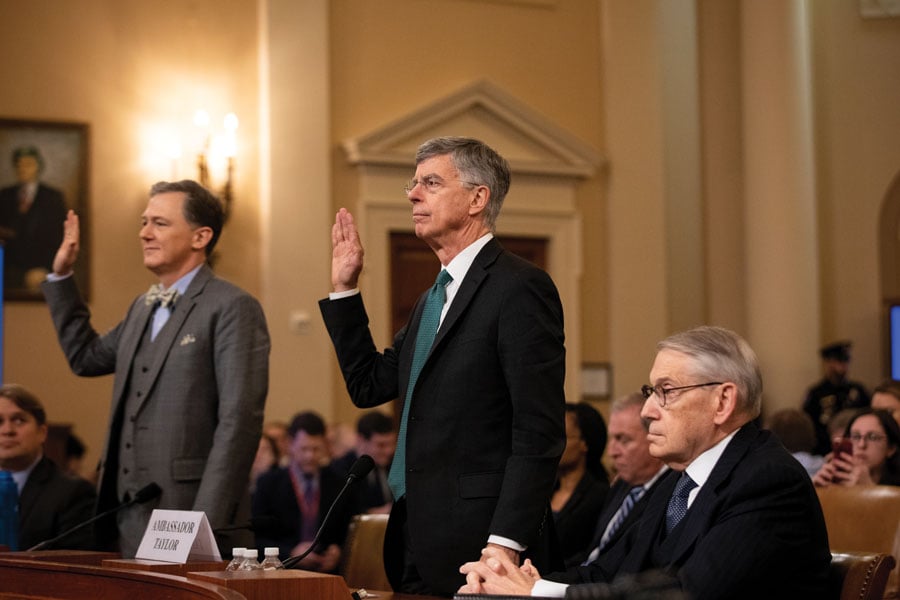Northwestern professors discuss first public impeachment hearing, impact on 2020 presidential race
Amanda Andrade-Rhoades(Sipa USA/TNS)
George Kent, deputy assistant secretary for European and Eurasian affairs, and William B. Taylor, acting ambassador to Ukraine, get sworn in to the House Intelligence Committee’s first public inquiry into President Trump’s interaction with the government of Ukraine.
November 14, 2019
The House Intelligence Committee heard two testimonies Wednesday morning in the formal impeachment inquiry’s first public hearing –– testimonies that will be key to tipping a small but important number of Americans who are undecided on the issue of impeachment, Medill Prof. Jon Marshall said.
The witnesses –– William B. Taylor Jr., acting ambassador to Ukraine, and George Kent, deputy assistant secretary of state for European and Eurasian affairs –– testified that President Donald Trump pressured Ukranian president Volodymyr Zelensky to open an investigation into 2020 presidential candidate Joe Biden and his son Hunter. Marshall called this portion of the impeachment inquiry “the performance stage,” and said media coverage and strategy are especially pertinent to these hearings.
“The strategy in early impeachment hearings was to layout a detailed, thorough narrative of what the president was accused of doing… (but) it’s less effective if people are consuming their news by what they’re seeing on social media,” Marshall said. “If the Democrats are going to sway public opinion, they need to think of ways to craft some compelling moments that will go viral.”
Only 10 percent of Americans see “some” or “a strong” chance they’ll change their mind on impeachment, according to a Nov. 13 POLITICO/Morning Consult Poll, but Marshall said 10 percent is enough to make Republicans in vulnerable districts think twice about supporting impeachment.
Pritzker Prof. Martin H. Redish said after listening to the hearing, he was particularly interested in a “potential bombshell” from ambassador William B. Taylor.
“The member of my staff could hear President Trump on the phone, asking Ambassador Sondland about ‘the investigations,'” Taylor said in his opening statement. “Ambassador Sondland told President Trump that the Ukrainians were ready to move forward.”
The account was pinned by Republican defendants as hearsay, a defense that Redish sees as central to Republican counsel Steve Castor’s case.
Despite seeing little chance two-thirds of the Senate vote to remove the President, Redish said these hearings will impact the 2020 presidency. There, he sees an opportunity for the public to “do the impeaching themselves.”
For this reason, he highlighted the importance of media coverage in these public trials. Beside offering transparency to an “extremely serious situation” –– being only the United States’ fourth impeachment inquiry –– Redish said the effects of the hearings could be read by future presidents as a justification for abuse of presidential power.
Though Redish did not discount partisan influence as a factor in the decision to begin impeachment inquiries, he said he saw the impeachment cutting deeper than party politics.
“I think the issues involved should be viewed as going well beyond partisanship. The question really is, who is it that the president is serving: the nation, or is it him or herself?” Redish said. “I really think that’s the question that has to be answered here.”
The impeachment proceedings will continue on the morning of Tuesday, Nov. 19 with testimonies from Jennifer Williams, an aide to Vice President Mike Pence, and Alexander Vindman, National Security Council aide.
Email: [email protected]
Twitter: @JacobHenryOhara


